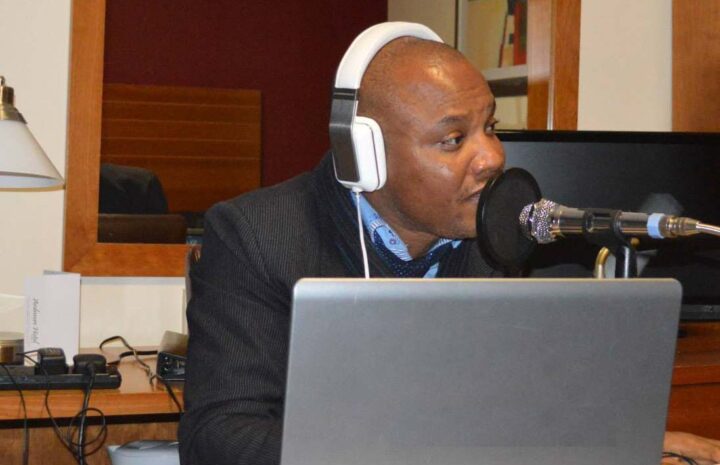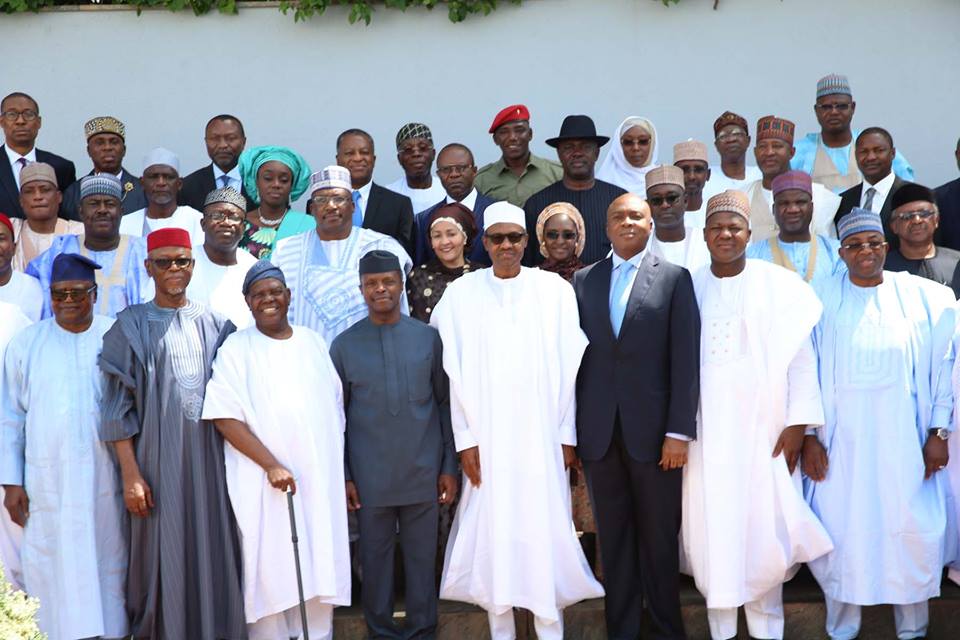“When we speak, the Zoo trembles. That is what happens when a cattle rearing terrorist and pedophile is your ruler. Message to every #Hardcore Biafran, if you find anybody in your village asking after Radio Biafra, kill the Baboon Awusa Foolani or Yorobber bast*ard. Let them keep searching as we keep tweeting for Biafra. Lunatics.”
The above excerpt was posted by Nnamdi Kanu, the London based director of the radio station, Radio Biafra, and a leading member of a movement agitating for Self-Determination from Nigeria to form the sovereign State of Biafra.
Now, let me say this; before I had the sickening experience of going to the social media platforms owned by Mr Nnamdi Kanu and reading the dangerously frightening, chilling and venomous hate-filled rhetoric that this young man has been spewing, I was one of those who disagreed with the current measures taken against him. I felt that his imprisonment was counter productive and I feared that there were frightening parallels between the current tensions raised by his incarceration and the sectarian, religious and anti-government rage that preceded the current insurgent uprising in the North East. In the same way that I felt the government could have handled the situation and fallout of Mohammed Yusuf’s capture in a more cautious manner, I also felt that the present government should handle the capture of Mr Nnamdi Kanu in a more cautious way. I still feel, going forward, that the government needs to be a lot more careful, strategic and structured in the decisions it makes on Mr Nnamdi Kanu.
While doing some background on Mr Nnamdi Kanu and reading his social media posts, I came across scores and scores of his hate filled rhetoric online, which legitimizes violence. I experienced three emotions. The first was of a mischievous amusement because his head looked like a Watermelon that was so absolutely ginormous he would probably need a mattress to serve as a pillow. I imagined that his nickname would be Mr Bobblehead. The second was an anxious curiosity I felt about his home environment as a child. I wondered what kind of toxic setting he grew up in that shaped this misguided young man into the hate filled reprobate making the posts I read. The third was a deep compassion I felt for him. I felt sad to see another, amongst us, whose heart was so condemned, it perished in the deep, dark, lonely dungeon of such bigotry and loathing.
Advertisement
I wanted to write on some of the issues that had been raised by Mr Watermelon-Head (if I may call Mr Kanu that since it seems so fitting) in his quest to actualize Biafra, however there were a plethora. Understanding and loving the South East and the people of the South East the way I do, I feel a responsibility to dissect the matters thoroughly. In order to do so, I will separate the main issues into different articles.
Considering the fact that the basis of Mr. Watermelon-Head’s campaign is hinged on a quest for self-determination for Biafra, I will first examine the legal ramifications and possibility of a declaration of political autonomy from Nigeria on the backdrop of the United Nations Declaration on Rights of Indigenous Peoples. It is not the first time the issue of Self-Determination from Nigeria has come up. In the past, groups have attempted to make use of Art 1(2) of the United Nations Charter as well as other International Covenants to assert the third generation right for political autonomy, however, the position of International legal principles and set precedents established in regards to Self-determination is not as simple and straightforward as one would assume. I’ll explain…
Under Art 1, ICCPR/ICESCR, Art 1(2), UN Charter; Art 20(1), ACHPR; Art 2, AL], it is provided that:
Advertisement
- “All peoples have the right to self-determination…”
- “All peoples may, for their own ends, freely dispose of their natural wealth and resources without prejudice to any obligations arising out of international economic co-operation, based on the principle of mutual benefit, and international law. In no case may a people be deprived of its own means of subsistence.”
- “The State Parties to the present Covenant, shall promote the realization of self-determination, and shall respect that right, in conformity with the provisions of the Charter of the United Nations.”
As clearly evidenced in the provisions of the United Nations Charter, international law has always held the right to self-determination at a high standing because its recognition is vital for the effective guarantee and observance of individual human rights and for the promotion and strengthening of those rights. However, even with the importance attached to this right, in the wake of decolonization, the right to self-determination stands as one of the most debatable aspects of modern international human rights law we have today.
The accepted view of self-determination is that it is a right exercised primarily by people living under colonial regimes, which could be exercised once and once only to remove the colonial regime in question. Essentially it was taken as referring to the right of a group of people, normally of one distinct territory, to decide collectively the manner in which they wish to be ruled or governed. However, even though the right to self-determination for all peoples is an apparently inalienable human right, it must be noted that it is not necessarily an absolute right. Most notably, its application to peoples living under non-colonial domination is not so apparent.
As a starting point, it must be established that the right to self-determination is a group right, but one of its main problems lies with its beneficiaries; who are the people to whom the rights ascribe? Due to the fact that the right is only exerciseable by ‘peoples’, the law has to be satisfied that those who seek it meet the threshold of ‘peoples’ under international set principles. The meaning to be attributed to the concept of ‘peoples’ for the rights of people in international law in this regard includes, groups who enjoy a common historical tradition, racial or ethnic identity, cultural homogeneity, linguistic unity, religious or ideological affinity, territorial connection or common economic life. The group as a whole must have the will to be identified as a people or the consciousness of being a people. In view of this definition, it is presumed that Mr. Watermelon-Head’s definition of the Biafran people satisfies the definition of ‘peoples’ for the purpose of securing their indigenous rights under the United Nations Convention.
Conversely, in respect of self-determination of ‘peoples’, two other vital aspects have to be distinguished; the internal and external aspect of self-determination. The right has an internal aspect, that is to say, the rights of all peoples to pursue freely their economic, social and cultural development without outside interference. In that respect, there exists a link with the right of every citizen to take part in the conduct of public affairs at any level, as referred to in Article 5 of the International Convention on the Elimination of All Forms of Racial Discrimination. In consequence, governments are to represent the whole population without distinction as to race, colour, descent or national or ethnic origin. On the other hand, the external aspect of self-determination implies that, all peoples have the right to determine freely their political status and their place in the international community based upon the principle of equal rights and exemplified by the liberation of peoples from colonialism and by the prohibition to subject peoples to alien subjugation, domination and exploitation.
Advertisement
Within the backdrop of establishing the internal and external aspect of self-determination follows the issue of territorial integrity. The main bone of contention for any group or peoples within a defined national boundary that wish to declare their right to self-determination is the fact that international law has developed within a framework of respect for the territorial integrity of a state. Cohabiting with the United Nations’ encouragement of self-determination is its very strict practice of respect for the territorial integrity of a State, a policy deeply against partial or total interference with the territorial integrity of a State. Territorial integrity and respect therefore is enshrined in the Charter of the United Nations, Art 2. The General Assembly, in Declaration 1514 on the Granting of Independence to Colonial Countries and Peoples in 1960 even went as far as purporting to exclude the exercise of self-determination by discernible groups: ‘Any attempt aimed at the partial or total disruption of the national unity and the territorial integrity of a country is incompatible with the purpose and principles of the Charter of the United Nations.’
In a leading Canadian case with similar facts to the declaration that Mr. Watermelon-Head may well rely on, the court was very clear on the position of United Nations Charter in regard to the right to self-determination of indigenous people within a defined state. On the question of whether international law principles recognize Quebecers right to self-determination which could legally effect the unilateral secession of Quebec from Canada, the court concluded that; ‘Canada is a sovereign and independent State conducting itself in compliance with the principle of equal rights and self-determination of peoples, thus the Quebecers had no right to secede’. In the judgement, the Supreme Court had recognized the right of a people to self-determination and acknowledged that much of the Quebec population satisfied the criteria for determining the definition of a ‘people.’ However, the court then distinguished between internal and external self-determination; the former being the accepted political development of a State and the latter could only be invoked unilaterally in extreme situations. The Quebecers were accorded internal self-determination insofar as their linguistic rights are recognised; they have a fair representation in national legislative, executive and judicial bodies and their culture is not threatened. The court received many submissions on behalf of other indigenous Canadians who also argued for their own territory and autonomy. But this point was not even addressed by the court because no application of the principle of self-determination was found as justified vis-à-vis Quebec and therefore no other indigenous group or tribe could invoke that right.
But even with these set principles, there are instances where international law applies a different criterion in cases it considers extreme. The scope of an extreme situation justifying external self-determination was addressed in the opinion of the African Commission of Human Rights in Katangese Peoples’ Congress V Zaire. It was suggested that where a State denies a group participation in the Government process and violates their fundamental rights, the territorial integrity of the State may not be such a paramount consideration.
Furthermore, other instances where support for the extension of the principle of Self-determination to indigenous populations may be inferred have been recorded. One such example was from the powerful separate opinion laid down in the Western Sahara Case. The judge opined that; “It hardly seems necessary to make more explicit the cardinal restraints which the legal right of self-determination imposes… It is for the people to determine the destiny of the territory and not for the territory to determine the destiny of the people.” But even such a strong ‘obiter’ is not without ambiguity. It could be inferred from this that the ‘people’ must be of a whole territory and hence the judgement conforms to the territorial view of the United Nations. On the other hand, the use of the term territory could be taken to mean that the land could be part of an existing State. This still causes some problems for self-determination with the colonial framework where questions of succession arise.
Advertisement
While unilateral secession is not specifically prohibited, it is clear that international law does not specifically grant component parts of sovereign states the legal right to secede unilaterally from their parent state. Self-determination is clearly acceptable for divesting States of colonial powers but the problems arise when groups not in solo occupation of a given defined State territory choose to exercise self-determination.
Although the policy of self-determination has had some notable successes in the post-colonialist era; for example in Czechoslovakia where the population voted to separate and become two States, the Czech Republic and Slovakia, international law tends to lean towards territorial integrity in a clash with claims for ethnic, cultural and religious self-determination.
Advertisement
As earlier stated, the right to self-determination as a group right applies to the people of a State wholly and not severally. The people that Mr. Watermelon-Head is referring to as Biafrans are the nationals of Nigeria as a whole. And even though Nigeria is a decolonized State that lacks cultural and ethnic homogeneity, the whole people of the territory achieved independence through the communal exercise of self-determination.
So, based on the set precedence of the International legal provision that Mr. Watermelon-Head probably would need to seek to rely on, would such a quest for political autonomy of Biafra from Nigeria succeed under the United Nations Charter? Given the fact that it would be difficult to argue that Biafra meets the threshold of a colonial people or an oppressed people or that they have been denied meaningful access to government to pursue their political, economic, cultural and social development, any quest he may have for self-determination under the United Nations Charter would be unlikely to succeed. International law would expect any such agitation for self-determination to be sought within the framework of Nigeria.
Advertisement
Now, let me briefly turn to Nigerian law. Based on Nigerian internal law, Mr. Watermelon-Head’s quest is also unlikely to succeed. Provided in the preamble to the Constitution of the Federal Republic of Nigeria ,1999 (as Amended), the entire people of Nigeria agreed that the Country should be One Indivisible and Indissoluble Sovereign Nation. It proscribes that;
“We the People of the Federal Republic of Nigeria: Having firmly and solemnly resolved: TO LIVE in unity and harmony as one indivisible, indissoluble, Sovereign Nation under God dedicated to the promotion of inter-African solidarity, world peace, international co-operation and understanding: AND TO PROVIDE for a Constitution for the purpose of promoting the good government and welfare of all persons in our country on the principles of Freedom, Equity and Justice, and for the purpose of consolidating the Unity of our people: DO HEREBY MAKE, ENACT AND GIVE TO OURSELVES THE following constitution…”
Advertisement
The foregoing is a collective agreement by the Nigerian People and for this principle of indivisibility and indissolubility to be undermined by any part of Nigeria it will require the people of Nigeria coming together to agree that a part of the nation has a right to what that part considers as self determination. The Constitution is the Organic Law, governing the rights, duties, obligations, and privileges of the people of Nigeria and its supremacy must at all times be fundamentally observed. For any group of persons to seek to divide the Nation under any guise would amount to a brazen attack on the Constitution.
Mr. Watermelon-Head has got the law, both international and internal, twisted! The second limb of the preamble to the Constitution makes provision aimed at engendering peaceful coexistence and unity of Nigeria. Perhaps, Mr. Watermelon-Head should be advised to concentrate his efforts on engaging the leadership of Nigeria for… better leadership rather than go on this ‘Frolic of his own!” It is likely that the grievances Mr. Watermelon-Head has is hinged on the failure of past political leaders to promote good governance and welfare of all persons on the principles of Freedom, Equality, and Justice that has heightened his agitation for the Biafran State, which threatens the peace of the Nation.
In a nation like Ethiopia it was possible for Eritrea to exercise her right to self determination because the Ethiopian law has liberal provision that guarantees such right unlike Nigeria where the Constitution does not admit of the exercise of a right to self determination.
Therefore, if Mr. Watermelon-Head wants to declare political autonomy from Nigeria in order to enforce the United Nations’ Declaration on Rights of Indigenous Peoples for the self determination of Biafra, he must keep in mind that in challenging the traditional anti-secessionist United Nations’ stand, the present United Nations’ practice dictates that only classic colonies, those Third-World nations under European domination can exercise the right to self-determination. In light of this, rather than relying on international law and the UN Convention or internal law to enforce his quest for self-determination, an internal decision making framework, such as a Constitutional Convention, National Conference or Constituent Assembly may be a more informed, advisable and sensible way for Mr. Watermelon-Head to present his argument for breaking away from Nigeria.
Next time, I will dissect another aspect of the issues that have been thrown up by the undertaking that Mr. Watermelon-Head also known as Mr Nnamdi Kanu has so audaciously committed himself to in his search for Biafra.
I invite you to:
Follow me on Twitter- @hanneymusawa
Visit my Website- www.hanneymusawa.com
Like my Facebook- www.facebook.com/hannatu.musawa
Text *(STRICTLY SMS REFERRING TO ARTICLES ONLY): 08116759753
Subscribe to my Youtube Channel-www.youtube.com/HannatuMusawa
Views expressed by contributors are strictly personal and not of TheCable.
Add a comment






